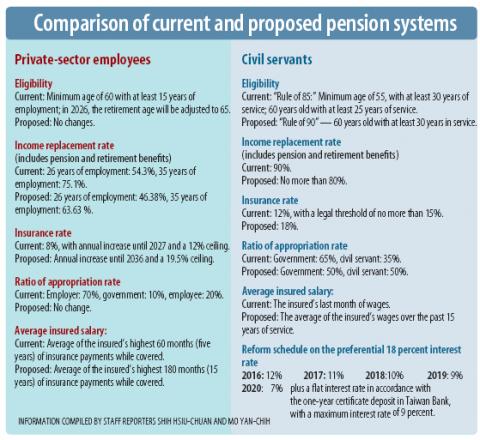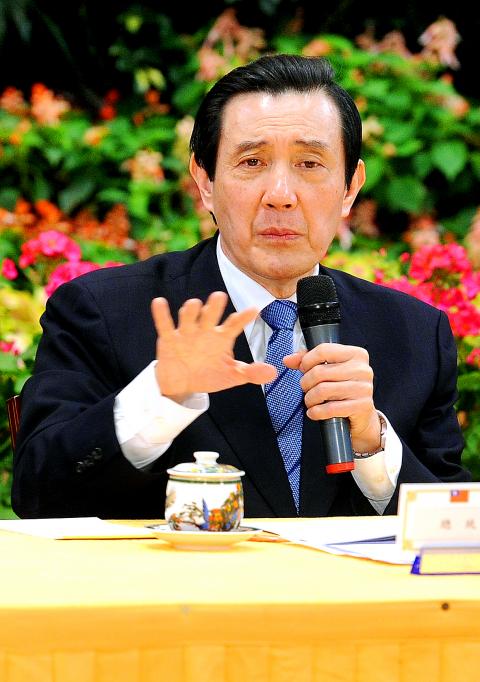President Ma Ying-jeou (馬英九) promised to protect the nation’s pension system from going bankrupt for the next 30 years as he unveiled the government’s pension reform proposals yesterday, insisting that his administration would strengthen its communication with the legislative branch as it prepares to send the draft for approval in April.
Accompanied by Premier Sean Chen (陳冲), Legislative Speaker Wang Jin-pyng (王金平) and Examination Yuan President John Kuan (關中) at a press conference to explain the government’s pension reforms, Ma said that he would give up his right to the 18 percent preferential interest rate on his retirement pension, which would be about NT$23,000 a month.
“The proposal is not perfect, but we’ve tried to make it a thorough one after gathering opinions. The pension system is everyone’s system and we cannot afford letting it collapse. People may receive less money after the reforms, but the revised pension system will assure that we receive our pension without having to worry for at least 30 years,” Ma said at the Presidential Office.

He described the nation’s current pension system first as a time bomb, then as a runaway train that is traveling toward a cliff, and said that it is a priority that the government reform the system immediately, else the Labor Insurance Fund and the retirement funds for the military, civil service and teachers would go bankrupt between 2019 and 2027.
“The pension system time bomb won’t explode during my term ... However, the train will definitely fall off the cliff if we don’t start building a bridge right now,” he said.
The proposed reforms are to be implemented in stages.

Photo: Chu Pei-hsiung, Taipei Times
Kuan said the government would adopt a “rule of 90” system for civil servants in 2016, in which a civil servant can only retire if their age and years in service add up to 90.
For example, a civil servant who has reached the age of 60 and has accumulated 30 years of service would be eligible for retirement. Currently, civil servants can retire if their age and years in service add up to 85.
There would be a 10-year grace period for the new system, while civil servants in special fields, such as police officers and firefighters, would be excluded from the new system, he said.
In the future, the retirement pensions of civil servants should not exceed 80 percent of their final income, he said.
The government also plans to reduce the contentious preferential 18 percent interest rate on savings accounts held by retired civil servants to 9 percent within the next four to five years, he said, adding that civil servants who retired before July 1999 would not be affected by the change.
Kuan said the government would also establish a three-tier pension system for civil servants.
The first tier would be a national pension with a 15 percent contribution from gross salary, the second a mandatory occupational scheme with a 30 percent contribution and the third a non-mandatory commercial pension, also with a 30 percent contribution.
When asked about the growing disputes over the reforms and divisions in society, Ma insisted that the government has tried its best to design a pension system that would narrow the gap between those working in different industries.
He said the government would review the system every five years as it seeks to establish a modernized and systematic pension policy.
Both Ma and Wang dismissed concerns about opposition to the government’s reforms among lawmakers across party lines.
Ma insisted that the government would continue to communicate with lawmakers regarding the reforms, while Wang said that he would facilitate the legislation once it is sent to the legislature for approval in April.

CHAOS: Iranians took to the streets playing celebratory music after reports of Khamenei’s death on Saturday, while mourners also gathered in Tehran yesterday Iranian Supreme Leader Ayatollah Ali Khamenei was killed in a major attack on Iran launched by Israel and the US, throwing the future of the Islamic republic into doubt and raising the risk of regional instability. Iranian state television and the state-run IRNA news agency announced the 86-year-old’s death early yesterday. US President Donald Trump said it gave Iranians their “greatest chance” to “take back” their country. The announcements came after a joint US and Israeli aerial bombardment that targeted Iranian military and governmental sites. Trump said the “heavy and pinpoint bombing” would continue through the week or as long

TRUST: The KMT said it respected the US’ timing and considerations, and hoped it would continue to honor its commitments to helping Taiwan bolster its defenses and deterrence US President Donald Trump is delaying a multibillion-dollar arms sale to Taiwan to ensure his visit to Beijing is successful, a New York Times report said. The weapons sales package has stalled in the US Department of State, the report said, citing US officials it did not identify. The White House has told agencies not to push forward ahead of Trump’s meeting with Chinese President Xi Jinping (習近平), it said. The two last month held a phone call to discuss trade and geopolitical flashpoints ahead of the summit. Xi raised the Taiwan issue and urged the US to handle arms sales to

State-run CPC Corp, Taiwan (CPC, 台灣中油) yesterday said that it had confirmed on Saturday night with its liquefied natural gas (LNG) and crude oil suppliers that shipments are proceeding as scheduled and that domestic supplies remain unaffected. The CPC yesterday announced the gasoline and diesel prices will rise by NT$0.2 and NT$0.4 per liter, respectively, starting Monday, citing Middle East tensions and blizzards in the eastern United States. CPC also iterated it has been reducing the proportion of crude oil imports from the Middle East and diversifying its supply sources in the past few years in response to geopolitical risks, expanding

Pro-democracy media tycoon Jimmy Lai’s (黎智英) fraud conviction and prison sentence were yesterday overturned by a Hong Kong court, in a surprise legal decision that comes soon after Lai was jailed for 20 years on a separate national security charge. Judges Jeremy Poon (潘兆初), Anthea Pang (彭寶琴) and Derek Pang (彭偉昌) said in the judgement that they allowed the appeal from Lai, and another defendant in the case, to proceed, as a lower court judge had “erred.” “The Court of Appeal gave them leave to appeal against their conviction, allowed their appeals, quashed the convictions and set aside the sentences,” the judges